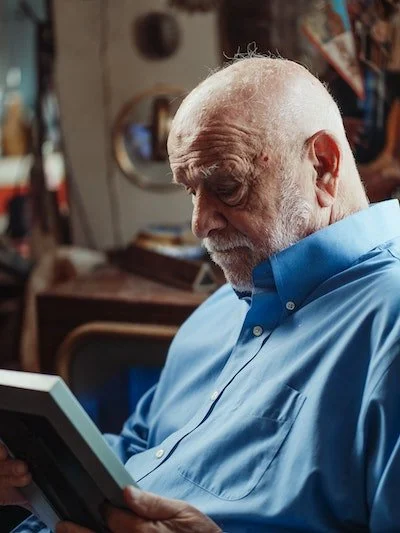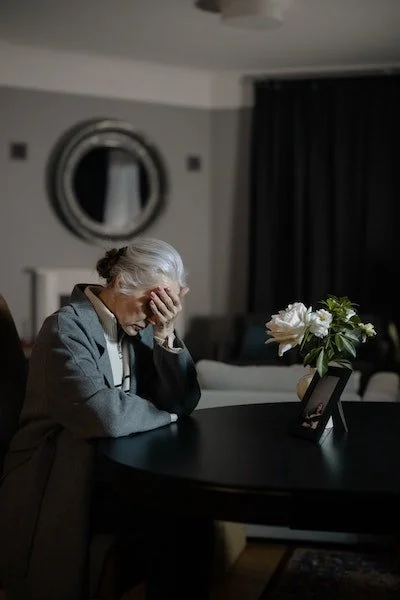
Grief Counseling
"Every season is one of becoming, but not always one of blooming. Be gracious with your ever-evolving self." -B. Oakman.
Has Your Life Been Sidelined By Grief?
Have you been devastated by a recent loss to the point where you don’t know how to resume life as usual? Along with sadness, do you often become angry and upset? Are you concerned that your grief has begun to interfere with your long-term outlook on the future?
Perhaps you struggle to get through each day and feel the weight of your sadness pressing down on you like a heavy blanket. Ruminating over the “What if’s…”, you might wonder if there was more you could have done to change the outcome of the situation. One moment you may experience a crying spell out of the blue while the next moment, become angry and full of rage. Your loss might even make you question your faith.
You May Feel Guilty Whenever You Don’t Feel Sad
When grief is at its worse, it can feel like you are drowning in sorrow and barely able to come up for air. And in the rare times when you do feel okay, you might feel guilty for having been happy. You may fear that moving on without your loved one means that you are forgetting them.
Rather than feeling comfortable sharing your grief with loved ones, maybe you’re avoiding their company, concerned that they may unwittingly trigger you or not know how to comfort you. Sadly, with avoidance comes isolation and a sense that no one truly understands your pain.
The good news is bereavement counseling is a therapy that allows you to process your grief on your own terms. Whether you are grieving the loss of a loved one, a pet, a marriage, or a friendship, grief counseling provides you with an unconditionally supportive shoulder to cry on.
There’s No Right Or Wrong Way To Grieve
Although painful and unwelcome, grief and loss are part of the human condition and something everyone will encounter at some point in their lives. The grieving process doesn’t follow a predetermined or predictable pattern—how it’s experienced and how long it lasts is unique to each person.
What’s more, grief isn’t exclusively associated with death. We often grieve following the loss of a marriage, friendship, career, or geographic location. An array of other issues, including aging, an accident, illness or injury can also cause grief.
Long talked about, The Five Stages of Grief is a theory developed by psychiatrist Elisabeth Kübler-Ross in 1969. Although these stages—denial, anger, bargaining, depression, and acceptance—provide us with a rudimentary blueprint of the grieving process, grieving is by no means a linear progression. We might bounce between its stages without rhyme or reason.
It Often Seems As Though Grieving Has No Place In Modern Society
Because modern culture is not comfortable acknowledging death as a normal part of life, most of us haven’t learned how to hold space for active grief. While we may send our “thoughts and prayers” over social media, most of us don’t feel truly equipped to support a friend who has suffered a loss. We’re more apt to sweep difficult emotions under the rug and push them to move forward rather than allow ourselves to sit in grief and really process it.
For this reason, we often worry about making others around us uncomfortable when we’re dealing with loss. Unfortunately, this can magnify our sense of loneliness and isolation at a time when we need support the most. Fortunately, therapy with a bereavement counselor is a place where you can process your grief without fear of judgment. Grief counseling will be time set aside just for you where you can talk freely without worry or concern.
Grief Counseling Offers You Unconditional Support
When you’re dealing with grief, it’s easy to convince yourself you’re not “doing it” right. You may feel guilty anytime you experience joy and then punish yourself for it afterward. Or maybe you are emotionally numb and can’t understand why the pain hasn’t hit you yet. Both reactions are completely normal. But, just because it’s “normal” doesn’t mean you have to experience grief alone.
Counseling gives you a safe place to confront your grief and process your thoughts and feelings without a filter. With a compassionate counselor dedicated to listening to what’s on your mind, you will never feel rushed when talking about your grief. Familiarizing yourself with the stages of grief will help you understand that there is no wrong way to grieve. However, recognizing when “normal” grief may be veering into routines and habits that are detrimental to your well-being will ensure that you establish a positive path forward.
What To Expect In Sessions
When you experience grief, oftentimes your mind wanders to the past—agonizing over what could have been—or to the future—pondering how will life ever be the same again. In grief counseling sessions, you will focus on grounding yourself in the here and now. Using mindfulness-based practices, you will learn to tap into all five senses to anchor yourself to the present moment. Bringing mindful awareness to pleasurable activities, such as taking a hot shower, enjoying a meal, or taking a walk can be very therapeutic while also reminding you that it's okay to feel okay.
I will also encourage journaling as a helpful practice to process your thoughts and feelings. Journaling is a way to acknowledge and honor your emotions without them impeding you from being productive. When you dedicate a few minutes each day to writing down what’s on your mind and getting it off your chest, you can then return to normal activities.
An Emphasis On Self-Care
One of the biggest takeaways of grief counseling is getting comfortable with the notion that you’re allowed to have good days. In that vein, we will prioritize self-care and ensure that you’re taking care of yourself. Whether it’s something as simple as getting your hair done or booking a massage, allowing yourself to experience pleasure is part of the grieving process.
Additionally, if you have pushed others away, we will set some goals around this, such as having you initiate a social gathering. Growing more comfortable being around others and allowing them to support you in your grief will remind you that you are not alone.
I know life may seem bleak right now—trying to move forward may be a daily, if not hourly, challenge. However, making sure you take care of yourself is an essential part of being able to think clearly. Grief counseling is part of that care-taking that can make a big difference in how you feel.
But You May Wonder Whether Grief Counseling Is Right For You…
What is grief and how long will it last?
Grief is a natural response to loss. While many focus on the emotional aspect of it, it's worth noting that there are physical, social, and cognitive reactions we also experience when grieving.
Unfortunately, there is no definitive answer to how long the grieving process will last. However, if the loss you experienced has impacted you to the point where you haven’t resumed normal activities, you may want to consider grief counseling. And even if you’re functioning reasonably well but looking for a safe place to unburden yourself, working with a grief therapist can help you process difficult emotions.
Attending grief and loss counseling won’t bring my loved one back or change anything so why bother?
While grief therapy will not bring your loved one back, it can help you in numerous ways. Speaking with a therapist about your grief offers you a safe place to discuss the thoughts and feelings you have and process your experience without feeling judged. With bereavement support, you will learn healthy ways to grieve and carve out time to sit with your pain. Yes, it will hurt and be exhausting at times. But even if you feel emotionally spent after you leave a session, that’s okay. It means that you are working through your grief.
I’m afraid talking to a counselor about my grief will be painful.
While it may be painful at times to process your grief with a therapist, the alternate option can lead to more pain down the road. If you choose to refrain from talking to others and, instead, bottle up your emotions, eventually you might experience a physical or emotional setback once the floodgates inevitably burst open. It’s okay to enlist the help of a grief therapist to sort through it all.
You Don’t Have To Walk Through Grief Alone
As a grief and bereavement counselor, I will be by your side, offering you support, compassion, and encouragement. If you would like to find out more about in-person or online grief counseling with me, you may call 716-817-0599, email me at lisamann@nyslmhc.com, or visit my contact page .





